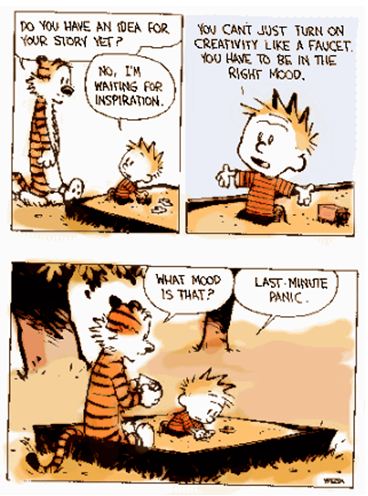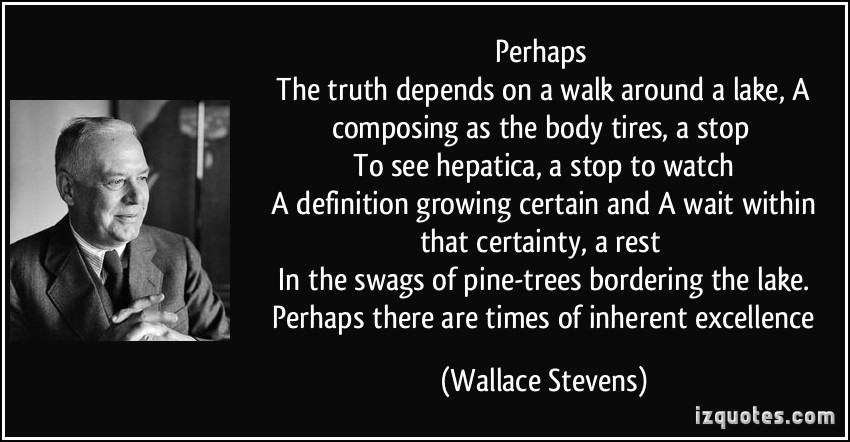To Do List
- Open current writing project document
- Check Twitter and Facebook
- Laundry
- Find cardboard boxes suitable for cloning and/or time machine
- Check Twitter and Facebook
- Scroll all the way to the end of opened document. Correct two typos.
- Nap time.
This week when I told my writing mentor I was working (I wasn’t, and he knew it), he sent me back the above. It covers my schedule pretty accurately.
If procrastination was a degree, I’d have honours. I don’t even know why I do it, because once I actually sit down and write, it is the best thing in the world. Nothing beats that moment when the words start coming thick and fast, when the ominous blank page becomes the familiar face of an old friend, or better yet, a new baby.
And yet, some days… that face is nowhere to be found. And the harder you look, the more it hides.
Calvin in Bill Watterson’s Calvin and Hobbes turns procrastination into an art form in several of the comic’s longer form stories. He pretty much hits the nail on the head.
Discipline is something writers need a ton of. Lucky for us, it can often be founding tagging right along with the last-minute panic.
Really, there’s no other answer than ‘sit the fuck down.’ I can’t remember exactly who wrote it, but I remember reading that inspiration can’t find you if you’re not at your desk. I know many, many ways of not being at my desk.
But, in the interests of sharing some other things I have read, I thought I’d put together a quick list of resources that have helped move me forward when the block hits.
Step one is, of course, asking yourself what’s stopping you from getting started. (My answer, apart from arthritis pain, is usually crippling self doubt. And there’s only one through that).
<Cue Halloween appropriate demonstrative image>
Step Two: Read. You can’t get anything out if you don’t put anything in. I don’t care what you read – books, comics, poetry, The Luminaries, My Cat Likes To Hide In Boxes, the back of a cereal box. Just read.
Here’s some good books on the topic
- Stephen King’s On Writing
- Virginia Woolf’s A Room of One’s Own
- Deborah Levy’s Things I don’t Want To Know
- Hunter S Thompson’s Kingdom of Fear. (Not all about writing, but still awesome).
Here’s some good articles
- ‘How I Write’ – William Dalrymple
- Geoff Cochrane talking about writing in These Rough Notes.
- William Gass interviewed in the Paris Review on the Art of Fiction. (This is brilliant).
Step Three: Listen to things
1. I have gone on until I am blue in the face about David Whyte, and I shall continue to do so because I am persistent and relentless. If you don’t listen to What To Remember When Waking, you really are missing out on something incredible. It is my go-to, my before-breakfast, my last resort. And not just for writing, but for pretty much my entire life. Go hyperbole that, then.
2. Outside. Birds inspire me. Shut up.
3. White noise. Rain tracks and the like can be incredibly helpful for focusing your mind. I use them constantly.
Step Four: A Walk Around The Lake
The American modernist poet Wallace Stevens is famous for the line “Perhaps the truth depends on a walk around a lake.”
The act of walking is cathartic. The act of seeing the lake – or whatever else may be out there – may loosen the cork in your brain. A tiny thought may be given enough air to become something sentient. Hepatica is a stalwart plant, known for withstanding many climates, and can be used as an astringent or demulcent for injuries. Perhaps you’ll find your Hepatica.
David Whyte talks about the neccessity of a walk around the lake, and Stephen King speaks of the same thing in On Writing. Having written nothing for weeks and unable to move forward, he left the house and began to circle the block. Halfway through this process, he finally came upon the solution. The time of inherent excellence – whatever it was, he would not have found it at home. So, go’on. Git.
Anyway, that’s me. If none of that works, I suggest you call it a day and get yourself one of these.




